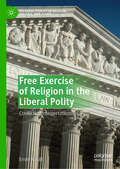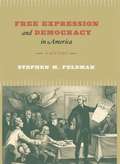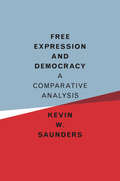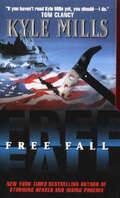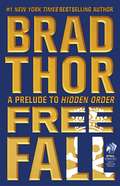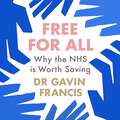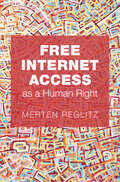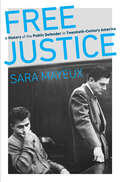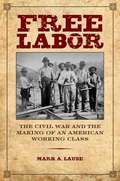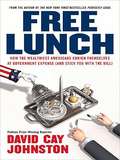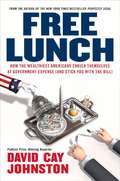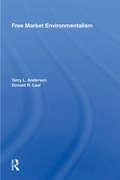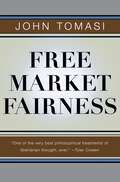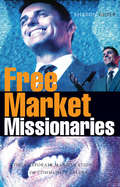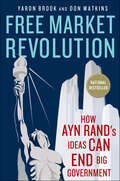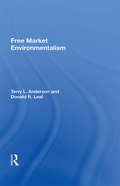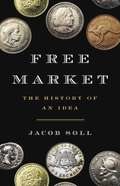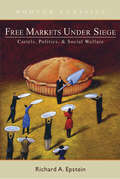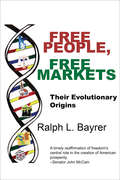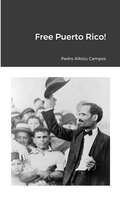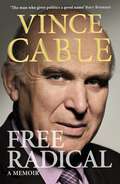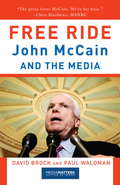- Table View
- List View
Free Exercise of Religion in the Liberal Polity: Conflicting Interpretations (Palgrave Studies in Religion, Politics, and Policy)
by Emily R. GillThis book addresses the challenge of providing for the free exercise of religion without allowing religious exercise by some individuals and groups to impinge upon the conscientious convictions of others. State neutrality toward religion is impossible, because neutrality means inattention to religion for some, but leveling the playing field through accommodations or exemptions for others. Both formal and substantive neutrality have a place in addressing particular conflicts. One such example is public funding for religiously affiliated social service programs, for which neither type of neutrality is satisfactory and thus some restrictions are justifiable; conversely, private voluntary organizations that do not receive direct public funding should be allowed wide latitude regarding their practices. This title also examines the expansive free exercise claims that are now made by those who argue that following the law impinges upon their beliefs, as exemplified by the ministerial exception and the Hobby Lobby and Masterpiece Cakeshop Supreme Court cases. It concludes by analyzing the relationship between neutrality and marriage as a civil status, which impacts a variety of commitment types and plural marriage.
Free Expression and Democracy in America: A History
by Stephen M. FeldmanCharting the course of free expression alongside the nation's political evolution, from the birth of the Constitution to the quagmire of the Vietnam War, Stephen M. Feldman argues that our level of freedom is determined not only by the Supreme Court, but also by cultural, social, and economic forces. Along the way, he pinpoints the struggles of excluded groups -- women, African Americans, and laborers -- to participate in democratic government as pivotal to the development of free expression.
Free Expression and Democracy: A Comparative Analysis
by Saunders Kevin W.Free Expression and Democracy takes on the assumption that limits on free expression will lead to authoritarianism or at least a weakening of democracy. That hypothesis is tested by an examination of issues involving expression and their treatment in countries included on The Economist's list of fully functioning democracies. Generally speaking, other countries allow prohibitions on hate speech, limits on third-party spending on elections, and the protection of children from media influences seen as harmful. Many ban Holocaust denial and the desecration of national symbols. Yet, these other countries all remain democratic, and most of those considered rank more highly than the United States on the democracy index. This book argues that while there may be other cultural values that call for more expansive protection of expression, that protection need not reach the level present in the United States in order to protect the democratic nature of a country.
Free Expression, Globalism and the New Strategic Communication
by Monroe E. PriceVast changes in technologies and geopolitics have produced a wholesale shift in the way states and other powerful entities think about the production and retention of popular loyalties. Strategic communication has embraced these changes as stakes increase and the techniques of information management become more pervasive. These shifts in strategic communications impact free speech as major players, in a global context, rhetorically embrace a world of transparency, all the while increasing surveillance and modes of control, turning altered media technologies and traditional media doctrines to their advantage. Building on examples drawn from the Arab Spring, the shaping of the Internet in China, Iran's perception of foreign broadcasting, and Russia's media interventions, this book exposes the anxieties of loss of control, on the one hand, and the missed opportunities for greater freedom, on the other. "New" strategic communication arises from the vast torrents of information that cross borders and uproot old forms of regulation. Not only states but also corporations, nongovernmental organizations, religious institutions, and others have become part of this new constellation of speakers and audiences.
Free Fall
by Kyle MillsFrom the #1 New York Times bestselling author of Vince Flynn's Mitch Rapp SeriesIt's bold. It's dangerous. It's the kind of maverick operation that has made Mark Beamon both the FBI's best agent and its least-likely-to-succeed screw-up.A top-secret FBI file -- buried in an anonymous government warehouse since J. Edgar Hoover's death -- is missing. The unlucky grad student who uncovered it is dead, and now his ex-girlfriend is on the run, accused of the murder. The only man everyone agrees can find the young woman and turn up the explosive document is "off-duty," suspended and under the threat of prosecution by the bureau itself.Beamon knows better than anyone that this is his last shot to save his career -- and his country. Tracking the young woman down, though, will be the hardest assignment he's ever tackled, for she's a gutsy world-class rock-climber who can drop out of sight anywhere in the world. And even if he finds her and the file, who can he trust when the FBI itself is under suspicion? Beamon has no room for wrong guesses -- or moves. If he blows this one, he'll free fall straight out of the bureau -- and straight into prison....
Free Fall: A Prelude to Hidden Order (The Scot Harvath Series #12)
by Brad ThorThe prelude to Hidden Order, Brad Thor's riveting and pulse-pounding Scot Harvath thriller.Experience the suspense and thrills only Brad Thor can write in Free Fall, the shocking prelude to Hidden Order.
Free For All: Why The NHS Is Worth Saving
by Gavin FrancisBritain's health service is dying. Gavin Francis shows us why we should fight for it.Since its birth in 1948, the powers that be have chipped away at the NHS. Now, Britain's best-loved institution is under greater threat than ever, besieged by a deadly combination of underfunding, understaffing and the predatory private sector.In the wake of the pandemic, we have come to accept a 'new normal' of permanent crisis and years-long waiting lists. But, as Gavin Francis reveals in this short, vital book- it doesn't have to be this way, and until recently, it wasn't. Drawing on the history of the NHS as well as his own experience as a GP, he introduces us to the inner workings of an institution that has never been perfect but which transformed the lives and health of millions, for free - and which has never been more important. For those who believe in the future of the NHS and its founding principles, this is essential reading from the bestselling author of Recovery and Intensive Care.
Free Hearts and Free Homes
by Michael D. PiersonBy exploring the intersection of gender and politics in the antebellum North, Michael Pierson examines how antislavery political parties capitalized on the emerging family practices and ideologies that accompanied the market revolution.From the birth of the Liberty party in 1840 through the election of Republican Abraham Lincoln in 1860, antislavery parties celebrated the social practices of modernizing northern families. In an era of social transformations, they attacked their Democratic foes as defenders of an older, less egalitarian patriarchal world. In ways rarely before seen in American politics, Pierson says, antebellum voters could choose between parties that articulated different visions of proper family life and gender roles.By exploring the ways John and Jessie Benton Fremont and Abraham and Mary Todd Lincoln were presented to voters as prospective First Families, and by examining the writings of Harriet Beecher Stowe, Lydia Maria Child, and other antislavery women, Free Hearts and Free Homes rediscovers how crucial gender ideologies were to American politics on the eve of the Civil War.
Free Internet Access as a Human Right
by Merten ReglitzMerten Reglitz proposes a new human right that ensures Internet access for those who cannot afford it and protects that right from arbitrary interferences by those that would exploit it for harm. The first part of the book justifies the claim for this new right by showing how Internet access is vital for the enjoyment of human rights around the globe. In the second part, Reglitz specifies the content of this right, assessing today's standard threats to Internet access. He recommends a minimum international standard of connectivity and explains how states have misused the Internet. He documents how private companies already manipulate both internet access and content to maximise profit, and how lack of rights enforcement allows people to harm others online. The book establishes that a new human right to free internet access is essential to secure its role for the benefit and progress, not detriment, of humanity.
Free Justice: A History of the Public Defender in Twentieth-Century America (Justice, Power, and Politics)
by Sara MayeuxEvery day, in courtrooms around the United States, thousands of criminal defendants are represented by public defenders--lawyers provided by the government for those who cannot afford private counsel. Though often taken for granted, the modern American public defender has a surprisingly contentious history--one that offers insights not only about the "carceral state," but also about the contours and compromises of twentieth-century liberalism. First gaining appeal amidst the Progressive Era fervor for court reform, the public defender idea was swiftly quashed by elite corporate lawyers who believed the legal profession should remain independent from the state. Public defenders took hold in some localities but not yet as a nationwide standard. By the 1960s, views had shifted. Gideon v. Wainwright enshrined the right to counsel into law and the legal profession mobilized to expand the ranks of public defenders nationwide. Yet within a few years, lawyers had already diagnosed a "crisis" of underfunded, overworked defenders providing inadequate representation--a crisis that persists today. This book shows how these conditions, often attributed to recent fiscal emergencies, have deep roots, and it chronicles the intertwined histories of constitutional doctrine, big philanthropy, professional in-fighting, and Cold War culture that made public defenders ubiquitous but embattled figures in American courtrooms.
Free Labor: The Civil War and the Making of an American Working Class
by Mark A. LauseMonumental and revelatory, Free Labor explores labor activism throughout the country during a period of incredible diversity and fluidity: the American Civil War. Mark A. Lause describes how the working class radicalized during the war as a response to economic crisis, the political opportunity created by the election of Abraham Lincoln, and the ideology of free labor and abolition. Grappling with a broad array of organizations, tactics, and settings, Lause portrays not only the widely known leaders and theoreticians, but also the unsung workers who struggled on the battlefield and the picket line. His close attention to women and African Americans, meanwhile, dismantles notions of the working class as synonymous with whiteness and maleness. In addition, Lause offers a nuanced consideration of race's role in the politics of national labor organizations, in segregated industries in the border North and South, and in black resistance in the secessionist South, creatively reading self-emancipation as the largest general strike in U.S. history.
Free Listening (Provocations)
by Naomi Waltham-SmithFree Listening offers a radical reframing of seemingly intractable debates and polarized positions on free speech, academic freedom, systemic injustice, and political dissent by shifting attention from our voices to our ears. Instead of reclaiming the terrain of free speech that is increasingly ceded to conservatives, Naomi Waltham-Smith argues that progressives should assume a more radical task—to liberate listening from those frameworks that have determined what freedom looks like, who enjoys it, and at what cost. Refocusing on aural responsiveness forces a confrontation with the liberal tradition that has traditionally anchored claims for freedom of expression and inquiry. If listening is placed at the heart of public deliberation and disagreeing well, the relational, open-ended, and unpredictable character of free expression becomes a common good. In a wide-ranging critical reflection on issues from civility to criticality, righteous anger to gentle listening, and silencing to streaming platforms, Free Listening makes an ambitious contribution to sound studies and political philosophy. Weaving together deconstruction, Black political thought, and decolonial theory, Waltham-Smith argues that the retort to accusations of &“cancel culture&” should be a revival of abolition democracy.
Free Lunch
by David Cay JohnstonThe bestselling author of Perfectly Legal returns with a powerful new exposé How does a strong and growing economy lend itself to job uncertainty, debt, bankruptcy, and economic fear for a vast number of Americans? Free Lunch provides answers to this great economic mystery of our time, revealing how today?s government policies and spending reach deep into the wallets of the many for the benefit of the wealthy few. Johnston cuts through the official version of events and shows how, under the guise of deregulation, a whole new set of regulations quietly went into effect? regulations that thwart competition, depress wages, and reward misconduct. From how George W. Bush got rich off a tax increase to a $100 million taxpayer gift to Warren Buffett, Johnston puts a face on all of the dirty little tricks that business and government pull. A lot of people appear to be getting free lunches?but of course there?s no such thing as a free lunch, and someone (you, the taxpayer) is picking up the bill. Johnston?s many revelations include: ? How we ended up with the most expensive yet inefficient health-care system in the world ? How homeowners? title insurance became a costly, deceitful, yet almost invisible oligopoly ? How our government gives hidden subsidies for posh golf courses ? How Paris Hilton?s grandfather schemed to retake the family fortune from a charity for poor children ? How the Yankees and Mets owners will collect more than $1. 3 billion in public funds In these instances and many more, Free Lunch shows how the lobbyists and lawyers representing the most powerful 0. 1 percent of Americans manipulated our government at the expense of the other 99. 9 percent. With his extraordinary reporting, vivid stories, and sharp analysis, Johnston reveals the forces that shape our everyday economic lives?and shows us how we can finally make things better. .
Free Lunch: How the Wealthiest Americans Enrich Themselves at Government Expense (and Stick You with the Bill)
by David Cay JohnstonJohnston shows how, under the guise of deregulation, a new set of regulations went into effect, that thwart competition, depress wages and reward misconduct.
Free Market Environmentalism
by Terry L. AndersonAlthough there is in the United States a clear national consensus supporting the protection of the environment, advocates often profoundly disagree about the policies best designed to achieve this end. The traditional answer has been that government must intervene, through legislation and regulation of behavior, to preserve environmental values. Th
Free Market Fairness
by John TomasiA provocative new vision of free market capitalism that achieves liberal ends by libertarian meansCan libertarians care about social justice? In Free Market Fairness, John Tomasi argues that they can and should. Drawing simultaneously on moral insights from defenders of economic liberty such as F. A. Hayek and advocates of social justice such as John Rawls, Tomasi presents a new theory of liberal justice. This theory, free market fairness, is committed to both limited government and the material betterment of the poor. Unlike traditional libertarians, Tomasi argues that property rights are best defended not in terms of self-ownership or economic efficiency but as requirements of democratic legitimacy. At the same time, he encourages egalitarians concerned about social justice to listen more sympathetically to the claims ordinary citizens make about the importance of private economic liberty in their daily lives. In place of the familiar social democratic interpretations of social justice, Tomasi offers a "market democratic" conception of social justice: free market fairness. Tomasi argues that free market fairness, with its twin commitment to economic liberty and a fair distribution of goods and opportunities, is a morally superior account of liberal justice. Free market fairness is also a distinctively American ideal. It extends the notion, prominent in America's founding period, that protection of property and promotion of real opportunity are indivisible goals. Indeed, according to Tomasi, free market fairness is social justice, American style.Provocative and vigorously argued, Free Market Fairness offers a bold new way of thinking about politics, economics, and justice—one that will challenge readers on both the left and right.
Free Market Missionaries: The Corporate Manipulation of Community Values
by Sharon BederIn her recent book Suiting Themselves, bestselling author Sharon Beder exposed how the global corporate elite have brazenly rewritten the rules of the global economy to line their pockets. In this new book she trains her sights on the insidious underbelly of this global trend to show how they have also orchestrated a mass propaganda campaign to manipulate community values and convince us that their interest - co-opting and controlling all of us in the name of the free market - is in our interest. During the 20th century, business associations coordinated mass propaganda campaigns combining 20th century American PR methods with revitalized free market ideology from 18th century Europe. The aim was to persuade people to eschew their own power as workers and citizens, and forego their democratic power to restrain and regulate business activity. Sophisticated corporate-funded think tanks augmented these campaigns in the 1970s and 1980s, promoting free enterprise and business-friendly policies. These ?free market missionaries? now seek to change individual and institutional values through bolder strategies such as expanding share ownership and manipulating wider public concerns. In each case the goal is the same: the triumph of business values over community values. Beder?s is an intellectual call to arms: challenge the ideology of the free market missionaries or be converted to it.
Free Market Revolution: How Ayn Rand's Ideas Can End Big Government
by Yaron Brook Don WatkinsNATIONAL BESTSELLERA look at how our current crises are caused by too much government, and how Ayn Rand's bold defense of free markets can help us change course.The rise of the Tea Party and the 2010 election results revealed that tens of millions of Americans are alarmed by Big Government, but skeptical that anything can or will be done to stop the growth of the state. In Free Market Revolution, the keepers of Ayn Rand's legacy argue that the answer lies in her pioneering philosophy of capitalism and self-interest –a philosophy that more and more people are turning to for answers. In the past few years, Rand's works have surged to new peaks of popularity, as politicians like Paul Ryan, media figures like John Stossel, and businessmen like John Mackey routinely name her as one of their chief influences. Here, Brook and Watkins explain how her ideas can solve a host of political and economic ills, including the debt crisis, inflation, overregulation, and the swelling welfare state. And most important, they show how Rand's philosophy can enable defenders of the free market to sieze the moral high ground in the fight to limit government. This is a fresh and urgent look at the ideas of one of the most controversial figures in modern history – ideas that may prove the only hope for the future.
Free Market/spec Sale/avail Hard Only
by Terry L. AndersonAlthough there is in the United States a clear national consensus supporting the protection of the environment, advocates often profoundly disagree about the policies best designed to achieve this end. The traditional answer has been that government must intervene, through legislation and regulation of behavior, to preserve environmental values. Th
Free Market: The History of an Idea
by Jacob SollFrom a MacArthur &“Genius,&” an intellectual history of the free market, from ancient Rome to the twenty-first centuryAfter two government bailouts of the US economy in less than twenty years, free market ideology is due for serious reappraisal. In Free Market, Jacob Soll details how we got to this current crisis, and how we can find our way out by looking to earlier iterations of free market thought. Contrary to popular narratives, early market theorists believed that states had an important role in building and maintaining free markets. But in the eighteenth century, thinkers insisted on free markets without state intervention, leading to a tradition of ideological brittleness. That tradition only calcified in the centuries that followed.Tracing the intellectual evolution of the free market from Cicero to Milton Friedman, Soll argues that we need to go back to the origins of free market ideology in order to truly understand it—and to develop new economic concepts to face today&’s challenges.
Free Markets under Siege: Cartels, Politics, and Social Welfare
by Richard A. EpsteinDrawing on his extensive knowledge of history, law, and economics, Richard Epstein examines how best to regulate the interface between market choice and government intervention—and find a middle way between socialism and libertarianism. He argues the merits of competition over protectionism and reveals the negative results that ensue when political forces displace economic competition with subsidies and barriers to entry. In the process, he provides an illuminating analysis of some of the ways that special interest groups, with the help of sympathetic politicians, have been able to manipulate free markets in their favor.
Free People, Free Markets: Their Evolutionary Origin
by Ralph L. BayrerThe author of Eternal Vigilance presents &“a compelling, new perspective on economic, political and cultural history&” (Phillip Scribner, Associate Professor of Philosophy Emeritus, American University). Adam Smith, the 18th century father of modern economics, once posed a provocative question: Why do some nations prosper while others do not? In Free People, Free Markets, author Ralph L. Bayrer presents the answer. Combining the economic theories of Smith, Friedrich von Hayek, and contemporary scholarship, Bayrer demonstrates the vital role of freedom in the creation of prosperity. In America as well as across the Western world, liberty, free markets, and scientific progress have been the all-important pillars of modern progress. &“Relying on thorough scholarship and clarity of argument, Bayrer makes the compelling case that mankind&’s progress in the last millennium rests on a narrow foundation of freedom, a lesson people forget at their peril.&” —John McCain, US Senator
Free Puerto Rico
by Pedro Albizu CamposPedro Albizu Campos (September 12, 1891 – April 21, 1965) was a Puerto Rican attorney and politician, and the leading figure in the Puerto Rican independence movement. Contained in this volume are the most prescient of his words on Puerto Rico, which to this day remains a subject of the United States of America.
Free Radical: A Memoir
by Vince CableToday Vince Cable is best known as "the undisputed heavyweight champion of the credit crunch in Parliament," revered for his prescience and authority on the world economic crisis. But his journey to become Britain's most respected politician has been long, circuitous, and sometimes very painful. In this memoir he tells that story for the first time. This is a candid book, written with wit and great insight. Vince Cable's life story is a long way from that of a conventional career politician. His book is as compelling as it is timely.
Free Ride: John McCain and the Media
by David Brock Paul WaldmanWe live in a gotcha media culture that revels in exposing the foibles and hypocrisies of our politicians. But one politician manages to escape this treatment, getting the benefit of the doubt and a positive spin for nearly everything he does: John McCain. Indeed, even during his temporary decline in popularity in 2007, the media continued to support him by lamenting his fate rather than criticizing the flip flops and politicking that undermined his popular image as a maverick. David Brock and Paul Waldman show how the media has enabled McCain's rise from the Keating Five scandal to the underdog hero of the 2000 primaries to his roller-coaster run for the 2008 nomination. They illuminate how the press falls for McCain's "straight talk" and how the Arizona senator gets away with inconsistencies and misrepresentations for which the media skewers other politicians. This is a fascinating study of how the media shape the political debate, and an essential book for every political junkie.
